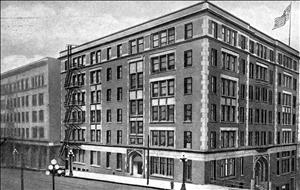In May, 1917, one month after the United States entered World War I, the Young Men's Christian Associations in the state of Washington establish a Washington War Work Council, headquartered at the Seattle YMCA, to provide wholesome alternatives to the diversions usually available to young men heading off to war.
For the moral reformers at the YMCA, the war presented "an extraordinary opportunity" to help purify the armed forces. Congress had banned the sale of alcohol to men in uniform and ordered the establishment of prostitution-free zones around military camps. Through the War Work Council, the YMCA hoped to further protect the "moral welfare of our young men" (Seattle's Young Men).
The Council coordinated the activities of various YMCA canteens, where soldiers and sailors could read, write letters home, join in group singing, watch movies, and engage in other uplifting activities. The goal was to "conserve the manhood" of the military forces by distracting them from the temptations of strong drink and suspect women. "The great army and navy that our government is now recruiting means a volume of temptation such as only a great aggregation of men can occasion," the Seattle YMCA pointed out in its monthly magazine, Seattle's Young Men. With help from the YMCA and like-minded organizations, the men would return home "clean and pure in body, mind, and soul."

